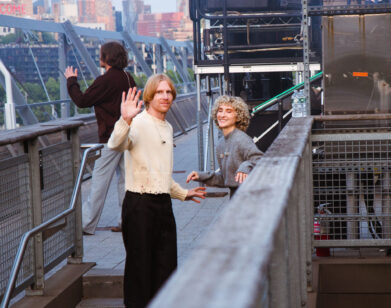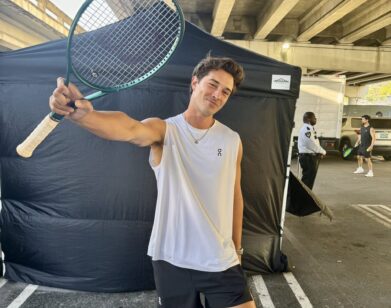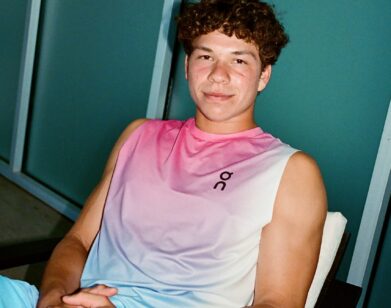Tennis is Sailing Away to Paul Simon, Angel Olsen, and the Verve

Photo by Luca Venter.
This is “Add to Queue,” our attempt to sort through the cacophony of music floating in the algorithmic atmosphere by consulting the experts themselves. Our favorite musicians tell us about their favorite music—the sad, the happy, the dinner party-y, the songs they want played at their funeral.
Alaina Moore is calling from Mexico. The location is not so surprising as the fact that she’s phoning in from dry land—although, can you get service in the middle of the ocean? I should have asked; Moore would know. The story of Tennis, which is the story of Moore and her other half Patrick Riley—the reigning royal couple of shag rug bedroom pop—is one in which the musical and the maritime are inextricably linked. The pair, who met at the University of Colorado, have been sailing since before the release of their first album, Cape Dory, in 2011. After a particularly difficult 2018, they set sail yet again. This Valentine’s Day, they washed up on white shores with Swimmer. True to its name, this is an album in perpetual motion. But even when it seeks to move forward, it maintains a certain sense of certainty—the kind that comes from trusting your breaststroke to keep your head above water. Or, for Moore and Riley, the kind that comes from ten years of marriage.
It would be easy to think, a decade into this thing, that Tennis knows their concepts almost too well. But despite having nailed a sound straight out of the heady hey-days of the ’60s and ’70s, this is not a band that does passé; they don’t even really do nostalgia, in the traditional sense. Moore explains it best when she tells me, “I like to linger with the things I love.” It is precisely this lingering that Tennis nails even better than The Cranberries ever did. Their synthy, somnambulant love songs never take us back in time so much as make their own. All of this is to say, even when Swimmer makes serious waves (and it does), it feels most reminiscent of tilting your head back under the Pacific sun and floating out to sea.
Here, Moore breaks away from road trip playlists and gives us some songs to sail away to.
———
ALAINA MOORE: I apologize in advance if we get cut off or anything. I’m in Mexico and my service kind of sucks.
JADIE STILLWELL: Oh no! That’s okay. We’ll play phone tag.
MOORE: I’ll just keep calling and calling.
STILLWELL: I know this upcoming album was recorded during a particularly rough time, or right after a really rough time, for you and Patrick. How did that translate into the album or into the recording of it?
MOORE: Well, because Patrick’s dad died while we were touring, we ended up thrown into a situation where music became our catharsis in a literal sense, almost out of necessity. It was happening at the very end of our album cycle, so we had already planned on going home to write music. We didn’t have any songs in mind, but we kept telling each other, “There’s no way our album won’t be spent processing this whole period in our lives.”
So we decided to go back to our boat for the initial stages of writing, mostly because we both feel like it’s hard to trust ourselves or to be in touch with our own instincts as writers unless we’re pretty disconnected from what’s going on in the world. We listen to music the way that any musician does, as fans and avid consumers, and we’re always very active, really seeking out what’s going on, what’s the new thing, and listening to everything as it comes out and just devouring it. When it’s time to write, we try to completely shut that part down and empty out, so that we can let ourselves fill the void of what we want to hear. It has to come from somewhere inside of us, and it’s really hard to shut out all the noise, literally, unless we kind of go away. But we ended up coming back. There’s a point where it’s like, “I need a piano.”
STILLWELL: What is it like to write on a boat? You have limited access to various instruments and tools, but do you find that particularly freeing?
MOORE: I do, and we really like, at least initially, working within serious constraints—but not necessarily with time constraints. I hate being rushed. I don’t feel like that suits me very well, but as far as my limitations with how I can craft a song, we only had a drum sequencer and Pro Tools and one guitar.
STILLWELL: Wow.
MOORE: It just changes what we write. I’ve set a goal for myself to try and do more storytelling with my lyrics and to think of a song as a short story instead of a poem, which is a big paradigm shift for me. I spent a lot of time reading Paul Simon and Bob Dylan lyrics and trying to be more narrative. Those were things that we were able to focus on when we were on the boat for a few months. And then, when we got home, we were able to flesh things out musically and with a lot more intention, with access to my synthesizers and a drum kits, and a bass and all those things.
STILLWELL: Speaking of your synthesizers, you guys have a very signature vintage-y sound. It’s a kind of ’60s or ’70s callback. Is that something that you’ve consciously worked to curate? Or is it just the natural progression of your interests and influences?
MOORE: Definitely the latter. I like to linger with the things that I love, and I like to explore the different iterations of them. We are rather rooted in the ’60s, ’70s genres, but I’ve found within that there’s everything on the spectrum, from folk to psych-rock to early electronic music. It can be natural sounding, or there can be synthesizers and drum machines. I don’t feel like there’s any limitation sonically. I also just feel like there’s something about the production that’s a little more songs focused. It’s not that I’m so committed to pop music, it’s that I really love songs in the classic sense. Honestly, I’m thrilled to be like a Carole King. She’s a songwriter, and whether she was writing for the Everly Brothers, or her own record, it’s extremely difficult to do. I am definitely not one of those people who thinks it’s easy to write pop music. I think it’s hard, and I think that’s what brings me back to it all the time.
STILLWELL: That’s a perfect segue into some of our questions about artists and musical moments that have influenced you. Do you remember what your very first concert was?
MOORE: Oh, I sure do. This’ll be interesting. I grew up a pastor’s kid, a homeschooled minister’s kid, so my first concert was the Christian rap band, DC Talk, in an arena. If you’ve never listened to them, do yourself a favor and do that. Especially the album Nu Thang from the ’90s. It’s just very special.
STILLWELL: What about your first favorite song, if you remember?
MOORE: Gosh. I definitely go through phases where I’ll be obsessed with one song, but I still wouldn’t be able to elevate it over and above something else. Actually, you know what? A song that Patrick and I both really really love that we always go back to is “Dolphins” by Fred Neil. He’s psych-folk. He was really influential to Harry Nilsson and things like that. That one holds up really well.
STILLWELL: What about the last song that you listened to?
MOORE: The last song that I listened to actually was “It’s My Life” by Jim Ford. It’s so beautiful. It’s this kind of strange country song.
STILLWELL: Do you have a favorite movie soundtrack?
MOORE: Instantaneously, I think of Romeo+ Juliet, the Baz Luhrmann soundtrack. It’s so good. That’s actually the first soundtrack I ever bought, and that I still go back and revisit.
STILLWELL: What about a song that always puts you in a good mood?
MOORE: Well, I have a favorite song to put on and dance to. It’s Ruby Andrews and the song is called, “You Made A Believer Out Of Me.” That’s a real, real jam. You can’t not smile and dance.
STILLWELL: That’s exactly what you need in a good mood song.
MOORE I actually listen to that song when I’m scared, which is really weird.
STILLWELL: Really?
MOORE: When I’m afraid of something, I listen to it, and I feel like nothing bad could happen.
STILLWELL: Do you feel like it calms you down? Or do you dance the anxiety away? Maybe they’re the same thing.
MOORE: Dance the anxiety away. It almost feels more like Lizzo in a way, even though this is an old song. It’s this powerful, confident anthem. It’s that feeling.
STILLWELL: Vintage Lizzo. What about your dream collaborator?
MOORE: That’s such a good question. Actually, one second…[to Patrick] Hey Pat, it’s Dave Fridmann, right? He’s, like, our favorite? Dave Fridmann. He was in The Flaming Lips, I believe. Was he in The Flaming Lips when we saw them? Pat’s saying, as Nigel Godrich is to Radiohead, Dave Fridmann is to The Flaming Lips. But he is involved in so many records—Tame Impala too. I think he mixed the Clairo record. He just does such interesting things with sound. I would love to work with him one day.
STILLWELL: Maybe he’ll see this and then you’ll collab.
MOORE: That would be a dream come true.
STILLWELL: What about your favorite music video of all time?
MOORE: Ooh. You know, I really like a lot of the Conan Mockasin music videos. They just have such a vibe that’s so well-adhered to.
STILLWELL: What songs or artists would you put on a road trip playlist?
MOORE: “The Earth Won’t Hold Me” By Kathy Heideman. She has this one random record that I’ve kept for the longest time. It’s so heavy, and the lyrics are incredible. And Hall & Oates, “Goodnight and Good Morning.” It’s off of one of their earlier records. That is such a jam. I just don’t know anyone who doesn’t like Hall & Oates. What’s not to like? It’s like not liking french fries. Also, there’s another really great song called “Seabird” by the Alessi Brothers.
STILLWELL: Speaking of the sea, do you guys have certain songs you listen to while you’re sailing?
MOORE: Yes, all of these. Sailing is our road-tripping.
STILLWELL: So this is really a sailing-trip playlist.
MOORE: Yep. I’ll also sometimes go down to the tip of my youth, like the Verve or Oasis or The Beta Band or whatever, and I’ll go back to those days often, when I do night drives, where I just want those big hits.
STILLWELL: Where you know all the words.
MOORE: And they’re from like 2003. Exactly.
STILLWELL: What about a playlist for if you were throwing a dinner party?
MOORE: When we have a dinner party, I’ll just put on Jim Sullivan’s U.F.O record front to back. Every song is amazing. That’s a classic go-to record.
STILLWELL: What about songs for crying in your bedroom?
MOORE: Honestly, that Angel Olsen single “Lark” from the new record. When I first heard it, tears came to my eyes. I was like, “Whoa.” I was having so many feelings. But if I was feeling like I wanted to get pretty deep down with my introspective self and have some deep feelings, then I would listen to Jessica Pratt.
STILLWELL: What about a playlist for smoking?
MOORE: Oh my gosh. Patrick and I found the perfect song for that. I can’t remember his name, because he’s so obscure, but…[to Patrick] Pat, who’s that guy who did “It Is So Nice To Get Stoned”? That’s literally what the song’s called. Hang on.
STILLWELL: No one is asking me, but if I were to answer this question, I would put your song “I Miss That Feeling” on my stoner playlist. It is on my stoner playlist.
MOORE: Amazing! Oh, that makes me so happy, especially since that song’s about anxiety, so that’s perfect. Ted Lucas! I found it. Ted Lucas, “It Is So Nice To Get Stoned.”
STILLWELL: Maybe the best answer we’ve ever gotten to this question.
MOORE: It’s kind of Fleet Foxes-y, only it’s from way before Fleet Foxes. But it’s this gorgeous, folky thing.
STILLWELL: What about a playlist of songs you would want to play at your funeral if you were going to plan in advance?
MOORE: Actually, I would want to play Pastor T.L. Barrett. The song is called “Like a Ship.” It’s a really beautiful, powerful song with a youth choir. The recording is live from a church in the ’70s, and even though I’m not really a religious person, something about having a gospel song feels very appropriate, and also very spiritually comforting, even if you don’t have any beliefs attached to it. The lyrics are, “Just like a ship without a sail, but I’m not worried.” It connects very well for me.
STILLWELL: What about your go-to karaoke song?
MOORE: Whenever I do karaoke, I always sing Jewel’s “Who Will Save Your Soul?” It’s so sassy. And so emotional. It’s one of the first songs I learned on guitar—after I learned all of my Michelle Branch covers.
STILLWELL: If you sing in the shower, what do you tend to sing in the shower?
MOORE: When I sing in the shower, I make up songs about Pat’s family dog. I never had a dog, but his parents have a dog, a collie named Arrow, named after that Harry Nilsson song “Me and My Arrow” because she has the pointiest nose and it looks like an arrow. I make up very long ornate ballades about the dog, with bridges and choruses.
STILLWELL: That’s your next album. It’s already written.
MOORE: I know, Songs For Dogs. I know.
STILLWELL: Speaking of albums, is there one that you think is objectively perfect, or that you could or do listen through all the way through all the time?
MOORE: Well, that Jim Sullivan record, U.F.O—that’s one of the rare records that we put on start to finish. But also, the first Paul Simon record, I’m pretty sure it’s just self-titled, but it’s the one with “Duncan” on it and “Me and Julio Down by the Schoolyard.” That album is perfect to me, too. I never get tired of that one. We actually went on a sailing trip—this was before smartphones. We only had a CD player and one CD, and it was that Paul Simon album. It is all we listened to for four months. And it never got old.
STILLWELL: If your life were a TV show, what would be the theme song?
MOORE: I jokingly have a very gothy, emo alter ego, and the theme song for that is that Garbage song, “Only Happy When It Rains.” And I’m just skulking around wearing black and looking longingly out of a window as rain pours down. Kind of like My So-Called Life.
STILLWELL: What is one song that, if you could, you would play for the entire world?
MOORE: Whoa. [To Patrick] Pat, what’s one song you would play for the entire world if you could? That’s so big that I have to involve my husband. This is a terrifying question.
STILLWELL: That’s why I save it for last.
MOORE: Pat’s picking “Tutti Frutti.” Something with no lyrics. God. What’s that The Verve song? “Bitter Sweet Symphony.” That’s what I’m going to pick. I think that’s good. There’s nothing not to like about that song. It’s not too serious. It’s just a dope song. [Laughs.] That’s good reasoning. Who cares?
Listen to Tennis’s “Add To Queue” playlist below, and follow Interview on Spotify for more.






